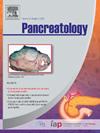A causal relationship between distinct immune features and acute or chronic pancreatitis: results from a mendelian randomization analysis
IF 2.8
2区 医学
Q2 GASTROENTEROLOGY & HEPATOLOGY
引用次数: 0
Abstract
Objectives
This study aimed to thoroughly examining the causal link between immune traits and four types of pancreatitis, using mendelian randomization.
Methods
Data on 731 immune traits were collected from the genome-wide association study (GWAS) database as exposure. Information regarding acute pancreatitis (AP), alcohol-induced acute pancreatitis (AAP), chronic pancreatitis (CP), and alcohol-induced chronic pancreatitis (ACP) were acquired from the FinnGen Consortium as outcomes. Mendelian randomization (MR) using inverse variance weighting (IVW) evaluated the links between immune traits and pancreatitis. We evaluated the robustness of the IVW results through sensitivity analyses and validated them using meta-analysis with AP and CP data from the UK Biobank in the GWAS catalog.
Results
A total of 36 immune traits showed significant associations with susceptibility of four types of pancreatitis, including AP (7 traits), AAP (8 traits), CP (14 traits), and ACP (7 traits). Twenty characteristics were found to be potential risk factors for pancreatitis, identified in B Cells (5 traits), conventional dendritic cells (cDCs, 2 traits), maturation stage of T cells (2 traits), monocytes (2 traits), myeloid cells (2 traits), T cells, B cells, natural killer cells (TBNK, 2 traits), and regulatory T cells (Treg cells, 5 traits). Multiple sensitivity analyses confirmed the validity of the findings. Meta-analysis confirmed a solid causal relationship between CX3CR1 on CD14− CD16−of monocyte panel and the susceptibility of CP.
Conclusions
Our MR study identified immune traits causally linked to acute and chronic pancreatitis, offering new insights for early clinical intervention and immune cell-targeted therapies.
不同免疫特征与急性或慢性胰腺炎之间的因果关系:孟德尔随机分析的结果。
研究目的本研究旨在通过亡羊补牢式随机化方法,深入研究免疫特征与四种类型胰腺炎之间的因果关系:方法:从全基因组关联研究(GWAS)数据库中收集了 731 个免疫特质的数据作为暴露。急性胰腺炎(AP)、酒精诱发急性胰腺炎(AAP)、慢性胰腺炎(CP)和酒精诱发慢性胰腺炎(ACP)的相关信息来自 FinnGen Consortium,作为结果。使用反方差加权(IVW)的孟德尔随机化(MR)评估了免疫特征与胰腺炎之间的联系。我们通过敏感性分析评估了IVW结果的稳健性,并利用GWAS目录中英国生物库的胰腺炎和胰腺癌数据进行了荟萃分析,验证了这些结果:共有36个免疫特征与四种类型的胰腺炎易感性有显著关联,包括AP(7个特征)、AAP(8个特征)、CP(14个特征)和ACP(7个特征)。研究发现,B 细胞(5 个性状)、传统树突状细胞(cDCs,2 个性状)、T 细胞成熟阶段(2 个性状)、单核细胞(2 个性状)、髓样细胞(2 个性状)、T 细胞、B 细胞、自然杀伤细胞(TBNK,2 个性状)和调节性 T 细胞(Treg 细胞,5 个性状)中的 20 个特征是胰腺炎的潜在风险因素。多重敏感性分析证实了研究结果的有效性。元分析证实,单核细胞面板 CD14- CD16 上的 CX3CR1 与 CP 易感性之间存在稳固的因果关系:我们的磁共振研究确定了与急性和慢性胰腺炎有因果关系的免疫特征,为早期临床干预和免疫细胞靶向疗法提供了新的见解。
本文章由计算机程序翻译,如有差异,请以英文原文为准。
求助全文
约1分钟内获得全文
求助全文
来源期刊

Pancreatology
医学-胃肠肝病学
CiteScore
7.20
自引率
5.60%
发文量
194
审稿时长
44 days
期刊介绍:
Pancreatology is the official journal of the International Association of Pancreatology (IAP), the European Pancreatic Club (EPC) and several national societies and study groups around the world. Dedicated to the understanding and treatment of exocrine as well as endocrine pancreatic disease, this multidisciplinary periodical publishes original basic, translational and clinical pancreatic research from a range of fields including gastroenterology, oncology, surgery, pharmacology, cellular and molecular biology as well as endocrinology, immunology and epidemiology. Readers can expect to gain new insights into pancreatic physiology and into the pathogenesis, diagnosis, therapeutic approaches and prognosis of pancreatic diseases. The journal features original articles, case reports, consensus guidelines and topical, cutting edge reviews, thus representing a source of valuable, novel information for clinical and basic researchers alike.
 求助内容:
求助内容: 应助结果提醒方式:
应助结果提醒方式:


